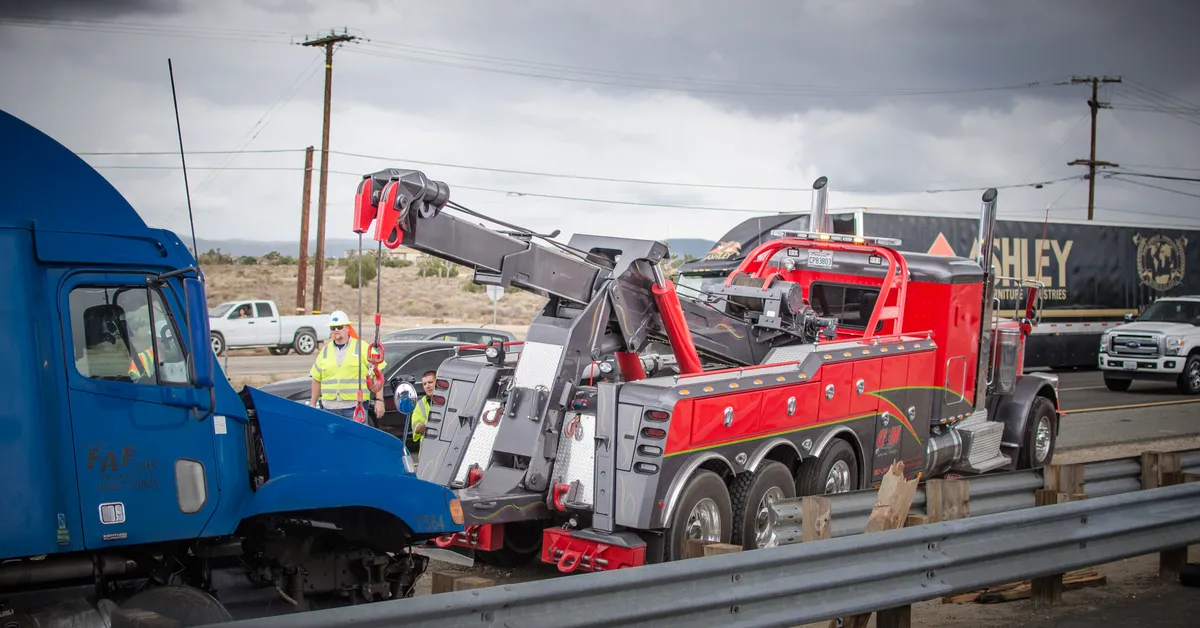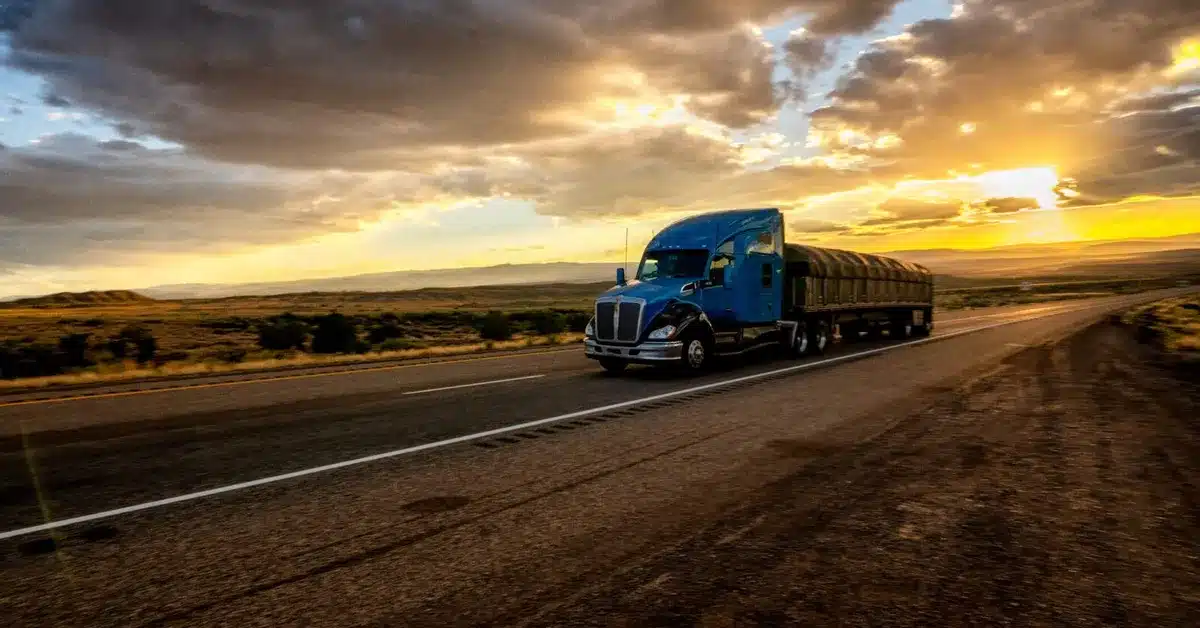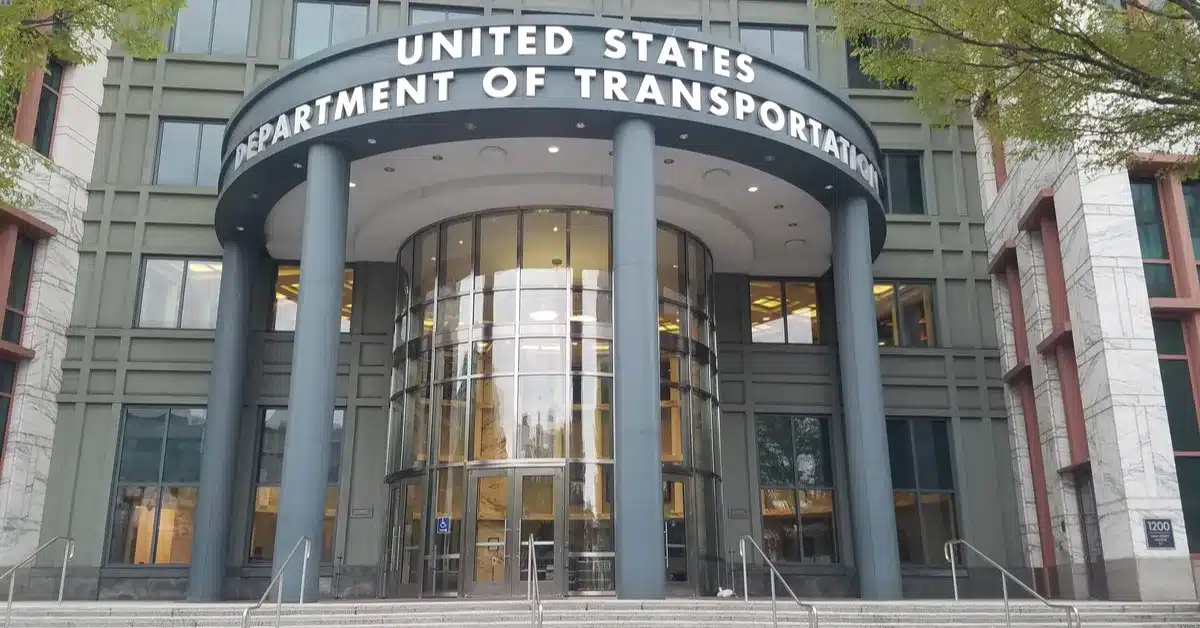Predatory towing isn’t just inflation. It’s more than just a few bad apples, and it’s not going away anytime soon. The well-documented rise of predatory practices around nonconsensual tows (police-ordered after a crash or on a private lot) represents a coordinated attack on trucking, some would say on an industrial scale.
This comprehensive guide aims to give you tools to fight back.
Table of Contents
$200,000 for recovery of a single-vehicle crash. $6,000 to move a tractor and trailer 16 miles. A 33-hour standoff with a wrecker holding a driver in their truck hostage. These are the predatory towing horror stories regularly making headlines, and the pace has only increased.
For big fleets, the threat mirrors that of nuclear verdicts. Legal and safety departments brace for an impact that could literally happen any time a driver gets behind the wheel.
For owner-operators, though, a $100,000 towing and recovery bill can spell out a death sentence for their career in trucking, maybe even ruin life at home, too.
A recent report from the American Transportation Research Institute lays bare the shocking statistics. In 2021, 82.7% of carriers reported being overcharged by towing companies. Another 82% said they’d been hit with ridiculous accessorial fees to jack up the price. While these numbers are grim, the carriers in the latter case were lucky to even be presented an itemized bill, given a number of states don’t require it.
The ATRI report provides a fantastic overview of the predatory towing problem. Both the American Trucking Associations and the Owner-Operator Independent Drivers Association hoped it would kick off an industry- and government-wide wave of resistance and legislation.
But don’t bank on that materializing quickly. Until the wider world acknowledges the grave realities around predatory practices, truckers need a resource. Here, find a step by step guide to protecting yourself with insurance and identification of fair rates and practices, likewise what to do in the event the worst happens and predatory tow hooks are on your truck and in your business.
Insurance, insurance, insurance …
Attorney Adam Brand, founder of Brand & Tapply, LLC, who was quoted at length in the ATRI report and has more than 25 years of experience fighting predatory towing cases in court, said the “biggest mistake” carriers make with regard to towing happens before the tow company even dispatches. It happens when the carrier picks their insurance.
“First and foremost, especially in the owner-operator area, these guys are incredibly exposed and incredibly vulnerable to predatory towers,” said Brand. “There’s a chance that they’re going to get disabled somewhere in the U.S. and get into situation where they are overcharged and their equipment held hostage until the invoice is paid. It’s a significant risk — literally a risk of going out of business every time they get behind the wheel.”
According to Brand, insurance companies are re-writing policies “recognizing the risk of predatory towing,” he said. It’s a risk plenty insurers recognize, with the National Insurance Crime Bureau taking up the fight in that arena and hosting webinars and issuing press releases on the scourge.
At a brass tacks level for an insurance company, “one mechanism to reduce risk is to put significant limits on how much they pay for towing and recovery or mitigation remediation,” Brand said, adding that he sees some policy limits as low as just $5,000 to $10,000.
But that’s a drop in the bucket, he said. A predatory invoice for a nonconsensual tow can quickly reach $25,000 to $100,000.
Therefore, the carrier’s “biggest vulnerability is trying to save some [insurance] premium dollars and not recognizing the risk,” Brand said. An insurer paying a policy’s $10,000 limit on an egregious $100,000 claim can simply “walk away” from the claim, leaving the carrier held hostage with no hope of an insurance adjuster’s thorough investigation.
“That’s the whole game right there,” said Brand. “Being properly insured.” With the right insurance, the predatory tower “becomes the insurer’s problem as far as how much will be paid, what investigations go on, and how to force vehicle out of the hands” of the tow company.
Otherwise, buckle up for a grueling battle in court, where frankly the options look bleak. Brand said that on average, carriers win about 50% of the invoice back in court. So if a towing company invoices $100,000, and the carrier thinks $10,000 represents a fair price, after a heap of legal fees and time in court, the carrier can probably expect a jury to order them to pay around $60,000.
But that’s only if the carrier treads carefully and documents everything starting the moment the tow is initiated. Often enough, that’s the scene of a tow, which we’ll explore next.
The scene of the accident, or incident
The towing and recovery industry do a lot of essential, life-saving work, but predatory towing has become a full scale attack on trucking companies.Oregon DOT
From the moment something goes bump on a public road or private lot, the fight against predatory towing begins. Based on conversations with Brand, his senior associate, Shahan Kapitanyan, and Pamela Bracher, the Deputy General Counsel at the American Trucking Associations, we’ve put together a step-by-step guide to what to do to track and control the towing invoice.
Post-accident, ask the police if they’ll allow you to contact your preferred towing company. If you’re not fortunate to personally know a local tower, there are networks of towing companies that guarantee their work and rates to avoid egregious billing. Otherwise, you’ll be at the mercy of whoever’s on the police’s rotation.
Document everything that happens during the towing and recovery. To the extent you can, make note of what equipment the company brings to the scene. Make note of the number of staff, the number of companies, and how long each person and piece of equipment stays on-site. Lots of predatory towing invoices lie about how much equipment was used or for how long.
Take pictures, video, or any other sturdy types of documentation.
After all communications with the tow company, send an email to put in writing the substance of the conversation. Documentation that holds up in court can’t just be diary entries, so try to get everything timestamped and in writing. If the towing company says on the phone they can’t talk now and will ask the boss later, send an email describing that interaction and stating your inquiry about the status of the recovery and that your message is time-sensitive.
Don’t sign any type of “consent to tow” or similar documentation. Some companies will try to make the tow seem like a consensual tow, but avoid signing any such paperwork. Assignment of benefits, approval of rates, guarantees of payment — you’re not obligated to sign these, and the lawyers contacted for this article recommend you don’t.
Push for an itemized invoice. The devil truly lurks in the details with predatory towing. Brand said he’s seen towing companies bill for overhead, as in invoicing a carrier for four headsets used by staff on-site, as if they’d discard the headsets fresh with each job. Sometimes, tow companies will attempt to bill for services they did not provide. For example, the fire department cleans up an environmental hazard, yet it appears on your bill from the tow company.
Look out for subcontractors on the invoice, which predatory towers often apply a markup to. The ATRI report gives a good idea of what typical per-pound and hourly rates look like to help you audit the invoice.
Immediately work to get cargo and equipment released. While the tow company holds your equipment hostage, you’re essentially an annuity to the predator, which can charge hundreds of dollars per day for simply keeping your equipment in their possession, according to Brand. This can include filing against a bondor paying under duress. Paying under duress does mean paying up, but making sure you’re preserving your rights at a later date to contest those charges. It’s critical to make sure the payment clearly states it’s under duress. If the tow company demands to be paid in cash, communicate in writing that it’s an unreasonable and unfair business practice and instead offer a certified check.
Their demand for cash represents “ongoing evidence of their unfair business practices,” said Brand. Such evidence should be reported to the state’s attorney general, towing board, or other relevant bodies.
Brand said that in some states, like Florida, companies are allowed to sell the seized equipment to pay the bill and that he’s seen cases where the equipment is sold in a “less than fair auction” for “a pittance.”
“A $50,000 piece of equipment purchased by the tower for $4,000,” for instance, he said, “which means they’ve effectively gained $46,000 off of this transaction.”
Once the equipment is released, the carrier will likely have to retain legal counsel, and a months- or years-long legal saga can ensue. But armed with credible documentation and a detailed breakdown of the costs and business practices of the towing company, the carrier stands their best chance of recovering the property.
Keep in mind: Trials are hard, take a long time, and expensive, too.
Also, the jury will decide. The company that presented an egregious, predatory bill will likely “dust themselves off pretty good” for a court appearance, according to Brand. They will try to “present themselves as a small business person, a person that is a first responder and available 24/7, someone who frequently puts themselves in harm’s way” and has to purchase expensive rotator and wrecker equipment in an uncertain business environment. There’s ample truth to that, too. Towing companies face a lot of the same challenges truckers face in terms of operations and cost inflation.
Prepare accordingly, act professionally, and know your enemy.
Documenting any breaches of regulations committed by the company, like improper storage of vehicles or unfair business practices, can go a long way toward disrupting their narrative in court.
Both Brand and ATA’s Bracher said there seems to be training going on in the towing and recovery industry around ways to inflate invoices to a predatory level. That’s it’s a coordinated and industrialized attack on carriers, and must be treated as such. Not just in court rooms, but in state houses via legislation.
Advocacy, legislation, and how trucking is fighting predatory towing
The ATRI report gives a good rundown of which states have the best laws protecting against bad towing practices. Maryland, Arizona and Colorado have all passed strong laws regulating the towing business. Indiana, the worst state for predatory towing, unsurprisingly, has no laws blocking maximum fees.
ATRI’s compendium of state regs should help carriers keep a close watch on the invoice items and rates, but according to the ATA, more needs to be done.
As such, ATA’s Bracher said the organization “works with state associations to reform legislation around maximum rates, hourly and per-pound rates, laws requiring itemized bills, bill dispute processes, as well as laws requiring release of cargo, laws requiring transparency in the police rotational call-out lists and how they put tow companies on them, who gets to stay on them.”
Additionally, laws must include “meaningful punishment for bad actors,” she said.
The ATA mostly supports state trucking associations in this endeavor, but remains active counselling carriers and tracking what laws are working and where. States trucking associations like Maryland’s have had success with ATA’s other associations’ support, which Overdrive detailed here.
An OOIDA spokesperson said they’re on the case, too. “We have a number of states legislators and state trucking associations interested in possible legislation regarding non-consensual and predatory towing,” the organization wrote. “We think the only real answer to stop the predatory practices is getting individual states to adopt towing boards, improved practices and other protocols.”
The association said it has “pushed back on predatory towing, in particular non-consensual towing, for a number of years in several states that include Missouri, Maryland and Tennessee and other states. We hope that the data collected for the report will inspire lawmakers to take action, seeing that there is indeed a problem with towing companies and little or no oversight.”
In summary, get involved pushing your state toward fair towing legislation, protect yourself with insurance that covers predatory tows, look into towing networks that provide fair service in 50 states, and if the worst happens and you’re in an accident or hit by a parking-enforcement tow company, document document document … and if need be give ’em hell in court.




